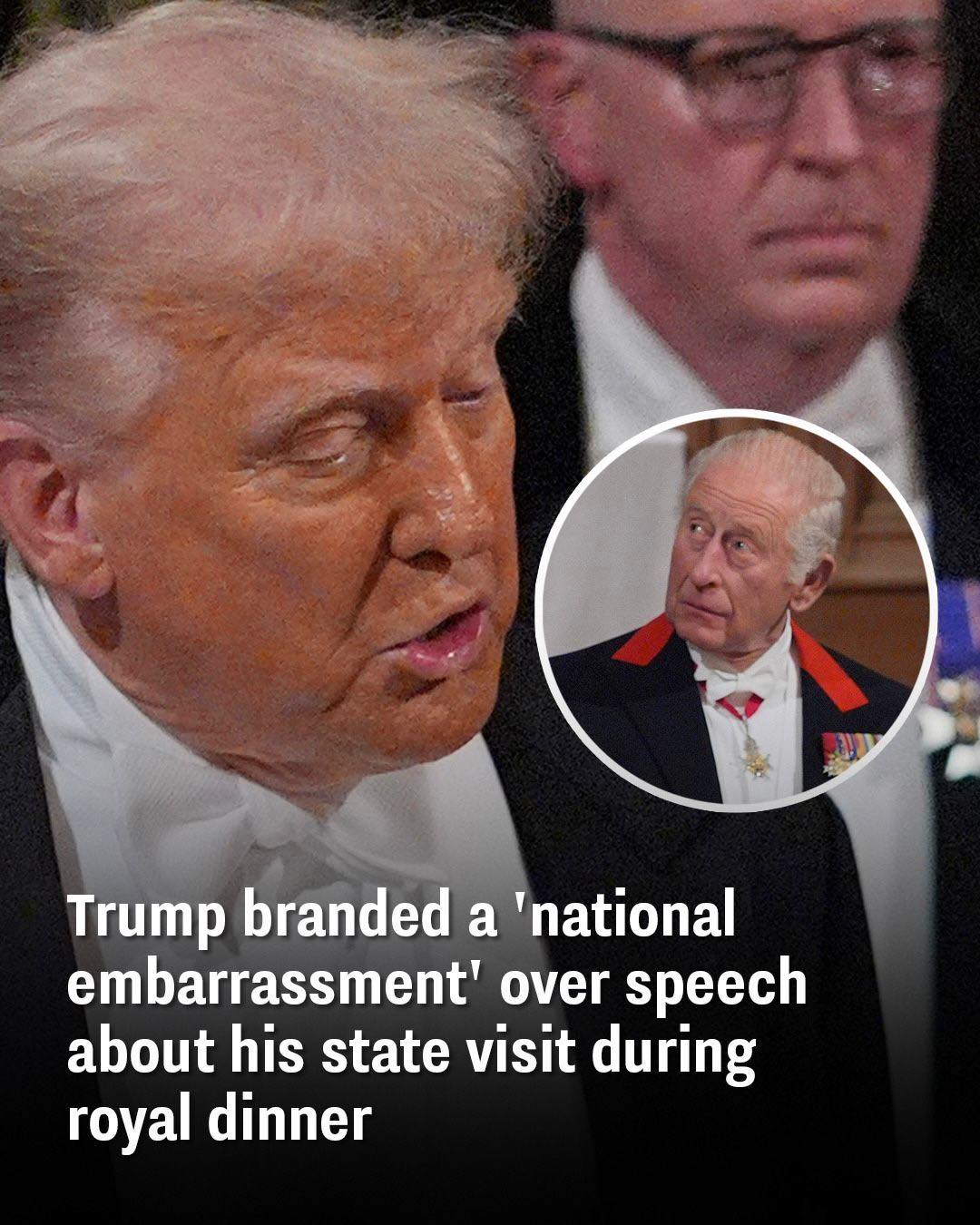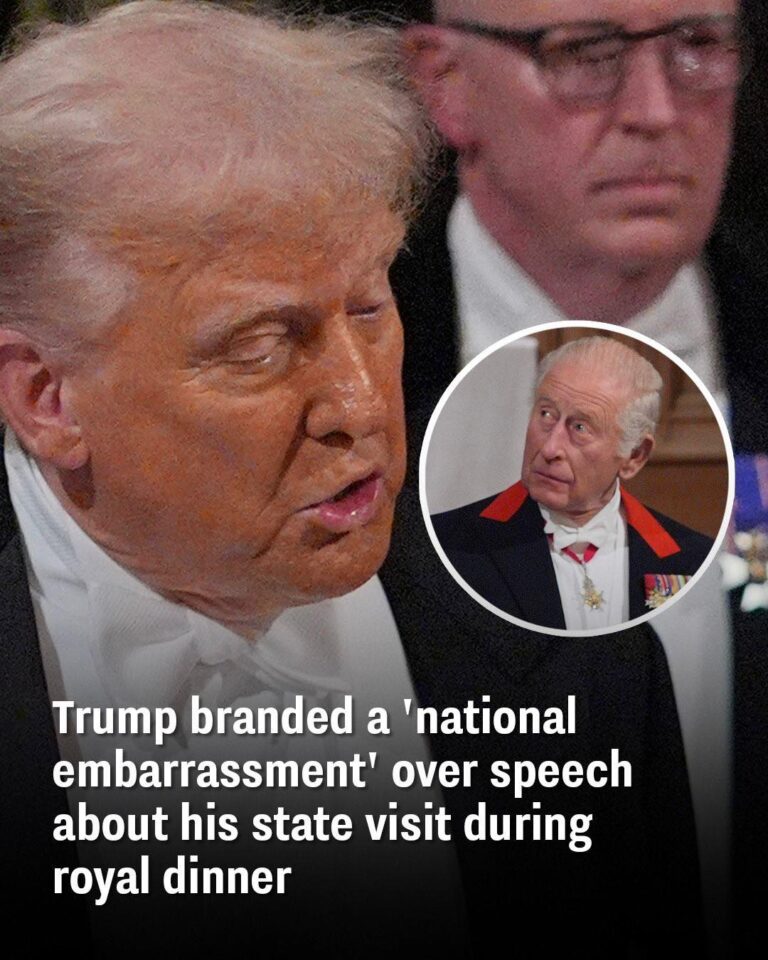
The grandeur of Windsor Castle has long been the backdrop for history. Its gilded halls have hosted monarchs, world leaders, and moments of ceremonial diplomacy designed to project stability, unity, and friendship. On September 17, 2025, that stage once again carried the weight of history as U.S. President Donald J. Trump joined King Charles III, Queen Camilla, and a glittering roster of global figures for a state banquet unlike any in recent memory.
The evening had been months in the making. When Prime Minister Sir Keir Starmer extended the invitation earlier this year on behalf of King Charles, it marked an extraordinary precedent: Trump would become the first American president in modern history to receive a second state visit to the United Kingdom. For the White House, the trip was meant to signal a renewed “special relationship.” For the palace, it was a chance to reaffirm centuries of Anglo-American ties.
But once the speeches began, the spotlight shifted swiftly from ceremony to controversy — and by the end of the evening, Trump was once again at the center of ridicule, branded by critics as a “national embarrassment.”
A Day of Royal Pageantry
Trump’s arrival had all the trappings of a royal affair. On September 16, the president and First Lady Melania Trump touched down in the UK to much fanfare. The following day, their schedule was packed with the rituals of state diplomacy. The couple were greeted by the Prince and Princess of Wales at Windsor Castle before proceeding to a private audience with the King and Queen.
The palace, steeped in tradition, was resplendent in its staging. More than 160 guests gathered under its vaulted ceilings for the state banquet, a guest list that blended political heavyweights with business and cultural leaders. Prime Minister Starmer took his seat among them, as did Apple CEO Tim Cook, OpenAI’s Sam Altman, and an array of cabinet ministers, ambassadors, and aristocrats.
For Britain, the moment was an assertion of continuity — a reminder that even amid turbulent politics, the monarchy serves as a bridge. For the United States, it was an opportunity to showcase alliance, trade, and unity.
The King’s Message
King Charles III opened the evening with words carefully chosen to highlight shared history and forward-looking ambition.
“Today, our alliance spans every field of endeavor and shows vast potential for growth,” he said, praising the enduring nature of Anglo-American cooperation.
He reminded the audience that the United Kingdom was America’s partner in the first trade deal of Trump’s administration, noting how it had created jobs and growth on both sides of the Atlantic. “No doubt we can go even further as we build this new era of our partnership,” the King added.
It was the kind of polished diplomatic speech one expects from the monarch — steady, deliberate, and rich in symbolism.
Trump Takes the Stage
When it was Trump’s turn, all eyes turned to the president. Banquet speeches at Windsor are usually remembered for their elegance and restraint. Trump, however, brought his trademark blend of improvisation, self-reference, and bombast.
“It is a privilege to be the first American president welcomed here,” he declared. “And if you think about it, a lot of presidents and this was the second state visit and that’s the first. Maybe that is going to be the last time — I hope it is, actually.”
The phrasing — meandering, contradictory, and unclear — left many in the audience perplexed. What exactly Trump meant by “the last time” was never clarified. Some interpreted it as a boast about being uniquely honored, others as an inadvertent suggestion he did not expect future presidents to be invited.
He pivoted, however, to a more conventional tone: “This is truly one of the highest honors of my life, such respect for you [the King] and your country.”
Trump also waxed lyrical about the U.S.-UK bond, describing it in musical and poetic terms. “We’re like two notes in one chord or two verses of the same prose. Each beautiful on its own, but really meant to be played together.”
For a moment, the words carried the elegance expected of the occasion. But it was the muddled start of the speech that dominated headlines the next morning.
Backlash and Mockery
Within hours, clips of the president’s remarks flooded social media. Journalist accounts, late-night comedians, and ordinary users alike dissected the awkward delivery.
“Zero seconds without being a national embarrassment,” one commentator posted on X, encapsulating a sentiment widely shared among Trump critics.
Another quipped: “It’s classic Trump banter: a muddled timeline, a dash of self-congratulation, and a wink at legacy.”
British newspapers were equally unsparing. The Guardian described the speech as “rambling and self-indulgent,” while The Times suggested that Trump had “turned a historic evening into an awkward spectacle.” Even traditionally conservative-leaning outlets acknowledged the speech’s odd phrasing had raised eyebrows.
Why These Speeches Matter
At first glance, it might seem trivial to scrutinize banquet speeches. Yet in diplomacy, tone often matters as much as content. Royal banquets are highly choreographed rituals designed to project harmony. Every phrase becomes a symbol, every slip a potential diplomatic gaffe.
Trump’s speech did include affirmations of the “eternal” and “unbreakable” U.S.-UK bond, but the confusion in his delivery overshadowed these lines. Critics argue that such moments reinforce perceptions of Trump as undisciplined and unpredictable — traits that can unsettle allies who prize clarity and decorum.
Trump’s Style Versus Royal Decorum
This is not the first time Trump has clashed with British sensibilities. During his previous state visit in 2019, his informal manner — walking ahead of the Queen, placing his hand on her back — made headlines. Supporters framed these moments as evidence of his authenticity and refusal to conform to rigid protocols. Detractors saw them as disrespectful to tradition.
At Windsor in 2025, the contrast was stark once again: a monarch delivering measured remarks, followed by a president whose improvisation bordered on incoherence. For many observers, the evening highlighted the cultural divide between Trump’s populist brand of politics and the ceremonial gravitas of monarchy.
The Broader Visit
Beyond the banquet, Trump’s visit included policy discussions with Prime Minister Starmer and joint announcements about defense cooperation and new technology trade agreements. Officials insisted that substantive progress was made behind the scenes.
But the enduring image of the trip may not be the handshakes or agreements, but the viral clip of Trump’s banquet speech — played, replayed, and ridiculed across the globe.
Looking Ahead
For all the mockery, Trump remains a figure who commands global attention. His ability to dominate headlines — even through missteps — ensures that every move becomes part of the political theater.
The banquet may be remembered less for the King’s steady diplomacy than for Trump’s controversial performance. Yet the underlying truth remains: the U.S.-UK relationship is larger than any single evening, speech, or leader.
Still, in moments meant to symbolize unity, words matter. And in Windsor Castle’s gilded halls, Trump’s words once again underscored the divide between how he sees himself — unique, historic, honored — and how critics see him: a national embarrassment.



